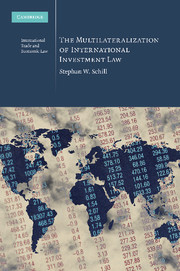Book contents
- Frontmatter
- Contents
- Preface
- List of figures
- Table of treaties, draft instruments, and related documents
- Table of cases
- I Introduction: globalization and international investment law
- II The dynamics of multilateralism and bilateralism in international investment relations
- III Treaty negotiation and multilateralization of international investment law
- IV Multilateralization through most-favored-nation treatment
- V Multilateralization and corporate structuring
- VI Multilateral enforcement of international investment law
- VII Multilateralization through interpretation: producing and reproducing coherence in investment jurisprudence
- VIII Conclusion: multilateralization – universalization – constitutionalization
- Bibliography
- Index
I - Introduction: globalization and international investment law
Published online by Cambridge University Press: 06 January 2010
- Frontmatter
- Contents
- Preface
- List of figures
- Table of treaties, draft instruments, and related documents
- Table of cases
- I Introduction: globalization and international investment law
- II The dynamics of multilateralism and bilateralism in international investment relations
- III Treaty negotiation and multilateralization of international investment law
- IV Multilateralization through most-favored-nation treatment
- V Multilateralization and corporate structuring
- VI Multilateral enforcement of international investment law
- VII Multilateralization through interpretation: producing and reproducing coherence in investment jurisprudence
- VIII Conclusion: multilateralization – universalization – constitutionalization
- Bibliography
- Index
Summary
And the more important international economic interests grow, the more International Law will grow.
Lassa Oppenheim, International Law, vol. I, § 51 (1905)Economic interests are among the driving forces for creating and forging legal rules. Law, as a consequence, does not impose only normative guidance for individual behavior, but is itself a product of society, its needs, and preferences, and has the objective of sustaining social exchange. This holds true not only in the domestic realm but also at the international level. In fact, international law is developing, growing, and being refined at an unprecedented pace as the need for international legal rules abounds in reaction to the social and economic phenomenon of globalization. Indeed, globalization, as one of the formative processes which affects today's cultural, political, and economic life virtually anywhere in the world, is gradually transforming international law from a simple tool to coordinate inter-State relations to an instrument that provides a legal structure for truly global social orders.
One of the characteristics of globalization is the growth of trans border economic activities: goods, services, and capital have progressively cast off territorial ties and circulate increasingly freely across borders. This development not only enhances the options and choices of individual economic actors, both consumers and producers, but leads to expanding economic interdependences and to the increasing, yet still incomplete, integration of national economies into a global economic system. At the same time, the release of economic activity from territorial linkages challenges both the ability of States to regulate their economy and their capacity to provide the legal institutions that are necessary for the functioning of a global economy.
- Type
- Chapter
- Information
- Publisher: Cambridge University PressPrint publication year: 2009



